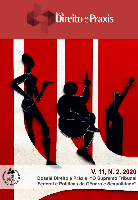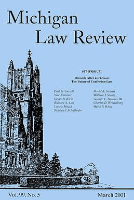
Direito e Praxis
Scope & Guideline
Illuminating critical legal issues through diverse perspectives.
Introduction
Aims and Scopes
- Critical Legal Studies:
The journal promotes critical legal studies that question prevailing legal norms and practices, emphasizing the role of law in perpetuating social inequalities. - Intersectionality in Law:
It explores how various forms of identity, such as gender, race, and class, intersect within legal contexts, highlighting the unique challenges faced by different groups. - Socio-Legal Research:
The use of empirical research methods to understand the practical implications of laws and legal systems on society, particularly regarding marginalized populations. - Environmental Justice:
Focus on the legal dimensions of environmental issues, particularly how laws impact vulnerable communities and the fight for sustainable practices. - Indigenous Rights and Legal Pluralism:
Investigates the intersection of law with indigenous rights, emphasizing the need for recognition of traditional knowledge and legal systems. - Feminist and Queer Legal Theories:
The journal incorporates feminist and queer perspectives in legal analysis, advocating for the rights of women and LGBTQIA+ individuals in legal contexts.
Trending and Emerging
- Climate Change and Law:
There is an increasing emphasis on the intersection of climate change and legal frameworks, particularly regarding environmental justice and the rights of affected communities. - Social Movements and Legal Responses:
The journal highlights the role of social movements in shaping legal discourse and the responses of legal systems to these movements, reflecting a growing interest in activism and law. - Digital Rights and Privacy:
Emerging discussions around digital rights, particularly in the context of surveillance and data protection, signify a response to contemporary challenges posed by technology. - Decolonial Legal Perspectives:
A rising interest in decolonial approaches to law, examining how colonial legacies continue to affect legal systems and advocating for indigenous and marginalized perspectives. - Health Law and Equity:
The journal is increasingly publishing on health law, particularly in light of the COVID-19 pandemic, focusing on equity and access to healthcare within legal frameworks.
Declining or Waning
- Traditional Legal Doctrines:
There is a noticeable decline in articles focusing on traditional legal doctrines and theories, as the journal increasingly embraces critical and interdisciplinary approaches. - Conventional Legal Education:
Themes related to conventional legal education methodologies are less frequent, as the journal emphasizes transformative pedagogical practices and critical legal education. - State-Centric Legal Analysis:
The focus on state-centric legal analysis has waned, with a growing emphasis on grassroots movements, community lawyering, and alternative legal frameworks.
Similar Journals

Alternative Law Journal
Challenging Norms, Shaping Perspectives.Alternative Law Journal, published by SAGE Publications Ltd, stands as a pivotal platform for critical discourse within the fields of law, sociology, and political science. Since its inception in 2008, the journal has fostered innovative scholarship aimed at exploring the intersections of legal practices and social justice, making it an essential resource for researchers, practitioners, and students alike. With its current ranking at Q3 in both the Law and Sociology categories according to the latest Scopus metrics, the Alternative Law Journal ensures a robust academic discourse, promoting diverse perspectives and challenging conventional norms. The journal's address reflects its international reach, further underscoring its commitment to fostering a global dialogue on pressing legal and societal issues. This journal is crucial for anyone seeking to stay updated with contemporary thoughts and research impacting law and society.

Revista CES Derecho
Advancing Legal Discourse, One Article at a Time.Revista CES Derecho is a distinguished academic journal published by UNIV CES, focused on the multifaceted field of law. Situated in Medellin, Colombia, this journal serves as a vital platform for disseminating innovative research and critical analysis in legal studies, encouraging the exchange of ideas among scholars, practitioners, and students alike. With its commitment to open access, the journal provides unfettered access to its content, ensuring that its valuable insights reach a diverse audience. Although specific metrics such as H-Index and Scopus rankings are currently unavailable, the Revista CES Derecho aims to enhance the quality of legal education and practice by fostering scholarly discourse and informing progressive legal thought. Researchers and practitioners are invited to contribute to this dynamic publication, further enriching the discourse in the ever-evolving landscape of law.

Derecho PUCP
Exploring the frontiers of legal research.Derecho PUCP is a distinguished open access journal published by the Pontificia Universidad Católica del Perú, specifically from the Faculty of Law. With a commitment to advancing legal scholarship, this journal has been an essential resource in the field of law since 2005, providing researchers, practitioners, and students with access to critical analyses and discussions on various legal topics. Based in Lima, Peru, Derecho PUCP holds a prestigious position with a Q2 ranking in the Law category, reflecting its impactful contributions to the social sciences, particularly in the legal domain. The journal publishes cutting-edge research and promotes innovative discourse, aiming to foster academic excellence and engage with contemporary legal challenges. As it continues to converge into its future issues from 2019 to 2024, Derecho PUCP exemplifies a vital platform for those committed to the pursuit of legal knowledge and research.

MICHIGAN LAW REVIEW
Elevating Legal Discourse with Rigorous AnalysisMICHIGAN LAW REVIEW, published by the Michigan Law Review Association, stands as a prestigious journal in the field of law, offering an influential platform for critical legal scholarship and discussion. With an ISSN of 0026-2234 and an E-ISSN of 1939-8557, this journal features a longstanding commitment to analyzing contemporary legal issues and contributing to academic dialogue. Situated in the United States, the journal reflects a rich historical legacy, with converged publication years stretching from 1974 to present, thereby preserving its position as a key resource for legal researchers and practitioners. Ranked in the Q1 category within its field for 2023, and holding a notable Scopus rank of 276 out of 1025 in the Social Sciences _ Law category, it plays a critical role in shaping legal thought and policy. Although not open access, its detailed articles and comprehensive reviews are instrumental for law students, academics, and legal professionals who seek to stay at the forefront of legal scholarship.

UNIVERSITY OF ILLINOIS LAW REVIEW
Connecting Scholars and Practitioners in the Legal RealmUNIVERSITY OF ILLINOIS LAW REVIEW, published by the esteemed University of Illinois, stands as a pivotal forum for legal scholarship since its inception. With an ISSN of 0276-9948 and an E-ISSN of 1942-9231, this journal serves the legal community by offering rigorous analyses and innovative insights into contemporary legal issues, making it an essential resource for researchers, legal practitioners, and students alike. Although not an open-access journal, it operates within the United States, with contributions stemming from a rich academic tradition. Notably, it holds a respectable Q3 category ranking in Law according to the 2023 category quartiles and ranks 360th out of 1025 in the Scopus Social Sciences Law rankings, placing it in the 64th percentile, affirming its significance in the legal discourse. The journal's scope encompasses a broad range of legal topics, from constitutional law to international legal studies, thus catering to a diverse readership keen on advancing their understanding of the law. In an era marked by evolving legal landscapes, the UNIVERSITY OF ILLINOIS LAW REVIEW remains committed to fostering intellectual engagement and promoting scholarly exchange among all members of the legal field.

YALE LAW JOURNAL
Shaping Tomorrow’s Legal Landscape TodayYale Law Journal, founded in 1891 and published by Yale Law J Co Inc, stands as a preeminent peer-reviewed legal journal in the United States, recognized for its rigorous scholarship and influential contributions to legal theory and practice. With an impact factor that underscores its peerless reputation, this journal maintains a Q1 ranking in the law category, situating it in the top tier of legal publications globally, as indicated by its Scopus rank of 66 out of 1025, placing it in the 93rd percentile. The journal publishes a comprehensive range of articles, essays, and reviews that address vital topics across the legal spectrum, aiming to foster dialogue and innovation within the legal community. Although it does not offer open access, its meticulous curation of content ensures that researchers, practitioners, and students alike have access to the most impactful legal scholarship. Located at 401-A Yale Station, New Haven, CT 06520, the journal continues to shape the legal landscape, making it an essential resource for anyone engaged in the study or practice of law.

LAW & SOCIETY REVIEW
Illuminating the Interplay between Law and SocietyLAW & SOCIETY REVIEW is a prestigious academic journal published by Wiley, recognized for its significant contributions to the intertwined fields of law, sociology, and political science. With an impressive impact factor that underscores its relevance, the journal boasts a 2023 Q1 designation in both Law and Sociology, highlighting its elite status within these disciplines. Since its inception in 1977, the journal has served as a critical platform for innovative research and discourse, reflecting contemporary issues that influence legal and societal frameworks. Although it does not currently offer open access options, its robust archival resources and global reach ensure that researchers, practitioners, and students can benefit from the insights and empirical studies presented within its pages. With Scopus rankings placing it in the top percentiles of its field, LAW & SOCIETY REVIEW remains essential for those seeking to deepen their understanding of law in its social context and explore the complexities of legal systems and their societal impacts.

Ius Humani-Revista de Derecho
Advancing Human Rights Discourse GloballyIus Humani-Revista de Derecho, published by Universidad Hemisferios, serves as a vital platform for discourse in the field of human rights law and its various dimensions. With an Open Access policy established since 2008, this journal ensures that scholarly articles, critical reviews, and original research are readily accessible to a global audience, fostering collaboration and innovation among researchers, professionals, and students alike. Although the journal is based in Quito, Ecuador, its reach extends internationally, making significant contributions to the understanding and application of human rights in legal frameworks. While it is still developing in terms of its HIndex and Scopus rankings, Ius Humani is poised to provide essential insights and discussions that reflect pressing legal issues and emerging trends in human rights law. Join the community of scholars engaging with this important field through Ius Humani, where knowledge is freely shared and impactful conversations are sparked.

COLUMBIA LAW REVIEW
Advancing Legal Thought, Shaping Tomorrow's JusticeCOLUMBIA LAW REVIEW, published by the COLUMBIA JOURNAL TRANSNATIONAL LAW ASSOCIATION, is one of the foremost legal journals in the United States, committed to advancing the discourse on critical legal issues. With an ISSN of 0010-1958 and an E-ISSN of 1945-2268, this prestigious publication has established a strong reputation, reflected in its Q1 rank in Law and a Scopus ranking of #145 out of 1025 journals in the social sciences category, placing it in the 85th percentile. COLUMBIA LAW REVIEW serves as a vital platform for legal scholars, practitioners, and students, publishing notable articles, case studies, and commentaries that influence both academic and practical perspectives on law. With a publication history spanning multiple decades, from its converged years of 1973 to 2024, it remains a key resource for those looking to stay updated on contemporary legal thought and developments. While it operates under a traditional subscription model, the journal’s rigorous peer-review process ensures the highest quality of scholarship in the legal field, solidifying its importance for both emerging and established legal professionals.

University of Western Australia Law Review
Illuminating Contemporary and Timeless Legal IssuesThe University of Western Australia Law Review is a prestigious academic journal dedicated to the critical examination and exploration of legal issues in Australia and beyond. Published by the Law School of the University of Western Australia, this journal has become a significant resource for legal scholars, practitioners, and students alike, contributing to the rich discourse in the field of law. With an ISSN of 0042-0328 and a current categorization in the Q3 quartile in the field of Law as per the 2023 rankings, it stands among a cohort of respected legal publications. The journal, though not open access, facilitates a sharing of unique insights and research from 2019 to 2024, aiming to address emerging and traditional legal challenges within a global context. With a Scopus rank of #651 out of 1025 in Social Sciences Law, it holds a percentile of 36, reflecting its valuable contributions to legal scholarship. The University of Western Australia Law Review invites researchers, practitioners, and students to engage with its rich content and to contribute to the ongoing dialogue shaping the future of law.